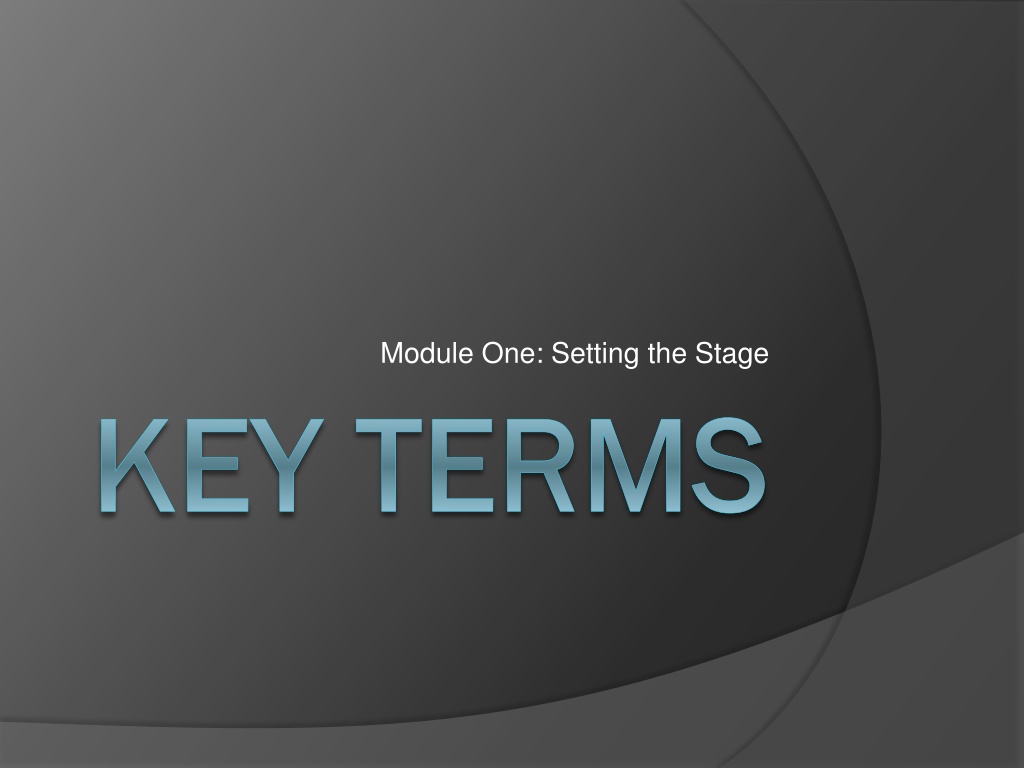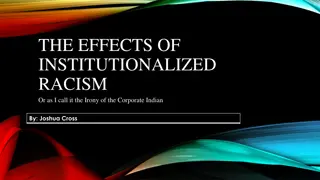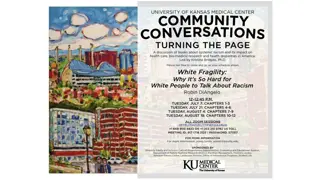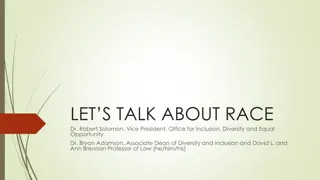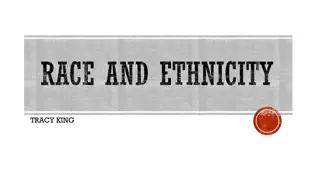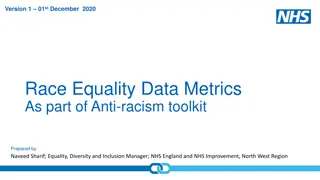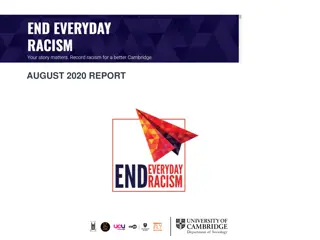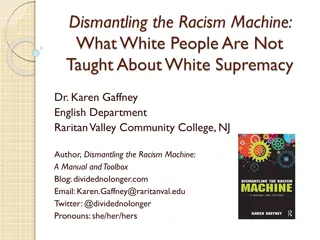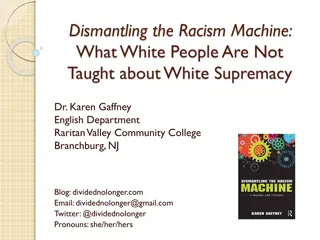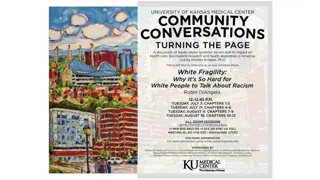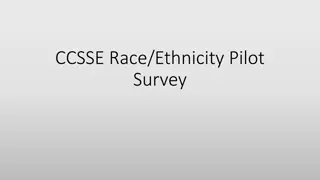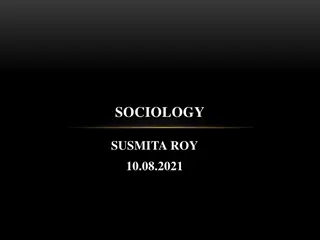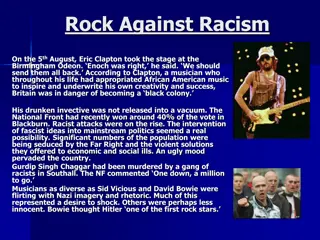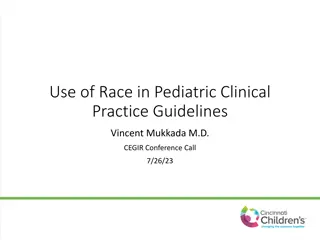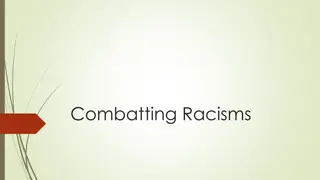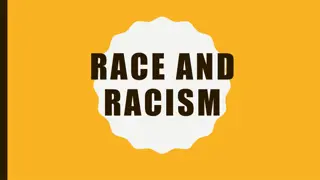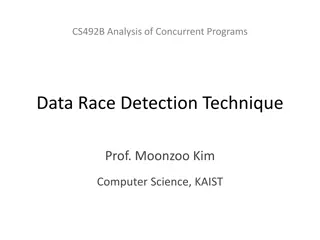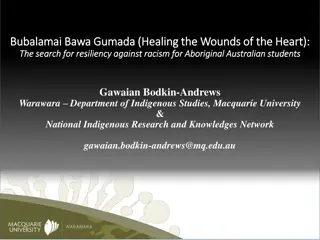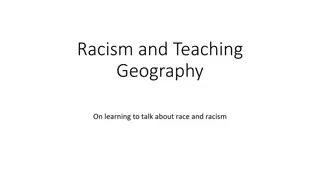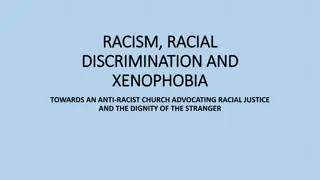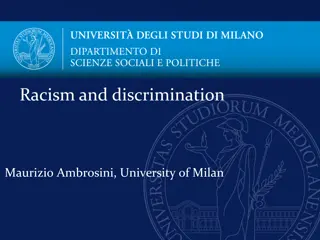Understanding Key Concepts Related to Race and Racism
Exploring the key terms such as ethnicity, nationality, race, racism, and types of racism including structural, individual, interpersonal, and internalized racism. It delves into the origins and implications of these concepts in society, shedding light on how race is a social and political construct used to maintain power dynamics, with a focus on the United States.
Download Presentation

Please find below an Image/Link to download the presentation.
The content on the website is provided AS IS for your information and personal use only. It may not be sold, licensed, or shared on other websites without obtaining consent from the author. Download presentation by click this link. If you encounter any issues during the download, it is possible that the publisher has removed the file from their server.
E N D
Presentation Transcript
Module One: Setting the Stage KEY KEY TERMS TERMS
Ethnicity Ethnicity refers to particular groups of people that share some common ancestry, traditions, language, or dialect.
Nationality the country to which a person is a citizen.
Race Race is a false classification of people that is not based on any real or accurate biological or scientific truth. In other words, the distinction we make between races, has nothing to do with scientific truth. Race is a political construction. A political construction is something created by people; that is not a natural development; is constructed or created for a political purpose. The concept of race was created as a classification of human beings with the purpose of giving power to white people and to legitimize the dominance of white people over non-white people.
Racism a belief that race is the primary determinant of human traits and capacities and that racial differences produce an inherent superiority of a particular race.
Structural Racism Structural Racism in the U.S. is the normalization and legitimization of an array of dynamics historical, cultural, institutional and interpersonal that routinely advantage whites while producing cumulative and chronic adverse outcomes for people of color. It is a system of hierarchy and inequity, primarily characterized by white supremacy the preferential treatment, privilege and power for white people at the expense of Black, Latino, Asian, Pacific Islander, Native American, Arab and other racially oppressed people.
Individual Racism Individual racism lies within individuals. These are private manifestations of racism that reside inside the individual.
Interpersonal Racism Interpersonal racism occurs between individuals. Once private beliefs come into interaction with others, the racism is now in the interpersonal realm. Intuition
Internalized Racism (1)Racism that impacts the psyches of people of color, until people of color believe about themselves what whites believe about them -- that they are inferior to whites (2)The behavior of one person of color toward another that stems from this psychic poisoning. Often called inter- racial hostility
Institutional Racism Institutional racism occurs within and between institutions. Institutional racism is discriminatory treatment, unfair policies and inequitable opportunities and impacts, based on race, produced and perpetuated by institutions (schools, mass media, etc.). Individuals within institutions take on the power of the institution when they act in ways that advantage and disadvantage people, based on race.
Prejudice A prejudice is a pre-judgment in favor of or against a person, a group, an event, an idea, or a thing.
Discrimination An action based on prejudgment The unjust or prejudicial treatment of different categories of people or things, esp. on the grounds of race, age, or gender
Stereotype To reduce somebody to oversimplified category. To categorize individuals or groups according to an oversimplified standardized image or idea.
Oppression An unjust exercise of authority or power.
Privilege a special right, advantage, or immunity granted or available only to a particular person or group of people.
White Privilege Is a set of advantages and/or immunities that white people benefit from on a daily basis beyond those common to all others. White privilege can exist without white people's conscious knowledge of its presence and it helps to maintain the racial hierarchy in this country.
Critical Race Theory An academic discipline focused upon a critical examination of society and culture, to the intersection of race, law, and power. CRT recognizes that racism is engrained in the fabric and system of the American society. The individual racist need not exist to note that institutional racism is pervasive in the dominant culture. This is the analytical lens that CRT uses in examining existing power structures. CRT identifies that these power structures are based on white privilege and white supremacy, which perpetuates the marginalization of people of color.
Anti-Racist A person who makes a conscious choice to act to challenge some aspect of the white supremacy system.
Microaggression Microaggressions are brief and commonplace daily verbal, behavioral, or environmental indignities, whether intentional or unintentional, that communicate hostile, derogatory, or negative slights and insults.
